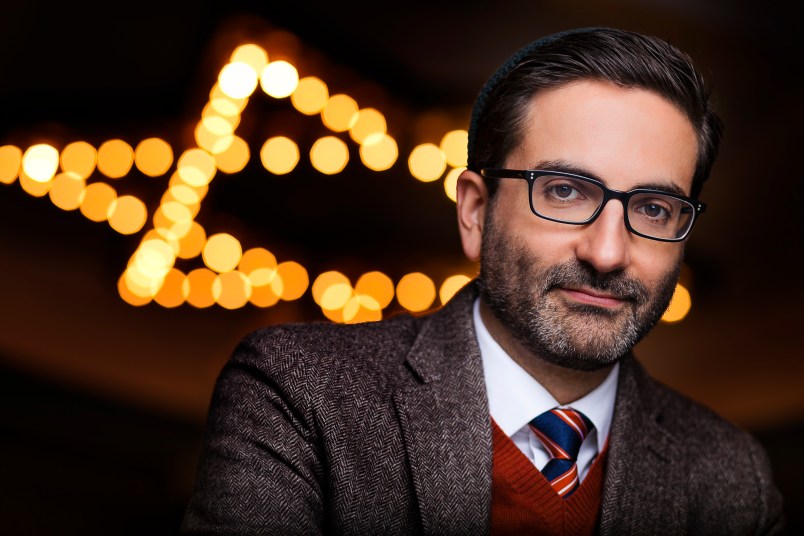I graduated from college going on twenty-five years ago and one of my college friends was Gil Steinlauf. We went to college together, then lost touch, then reconnected some years ago through Facebook or perhaps just an email. We exchanged a few notes. No more. But I’ve watched from a distance as he became an increasingly prominent rabbi, both in Washington, DC where he’s the senior rabbi at the Adas Israel congregation and also nationally.
Then today I saw a post from Gil on my Facebook feed about “personal news” he’d just shared with his congregation, about gratitude for support, compassion. My gut tightened. Clearly something weighty, serious. My first thought was an illness. Happily, no.
The news was that Gil and his wife have decided to divorce because Gil has come to the realization that he is gay.
I have no better than average gaydar, probably worse. This aspect of Gil’s life and identity had never occurred to me. Actually, that’s soft-pedaling it: I was stunned.
There was something about the young man I knew a generation ago which made him seem two or maybe three degrees out of sync with himself – something that made him seem especially human to me. Perhaps I was sensing some element of this.
Happily, Gil is part of conservative Judaism where such a revelation need not be career-ending today. The synagogue’s lay leadership has stated clearly that it supports his decision and supports him. But in a religious community in which not only is family central (nothing unique there) but where the family of the rabbi is a central part of the congregation’s communal experience, a divorce, even under such unique and apparently amicable circumstances, must be wrenching and difficult over and above the profound pain tied to any divorce.
What stood out to me was this passage (full text here) …
I sought to marry a woman because of a belief that this was the right thing for me. This conviction was reinforced by having grown up in a different era, when the attitudes and counsel of adult professionals and peers encouraged me to deny this uncertain aspect of myself. I met and fell in love with Batya, a wonderful woman who loved and accepted me exactly as I am. Together, we have shared a love so deep and real, and together we have built a loving home with our children–founded principally on the values and joys of Jewish life and tradition. But my inner struggle never did go away. Indeed, Batya herself has supported me through this very personal inner struggle that she knew to be the source of great pain and confusion in my life over decades.
It’s really this single sentence: “This conviction was reinforced by having grown up in a different era, when the attitudes and counsel of adult professionals and peers encouraged me to deny this uncertain aspect of myself.”
There is quite a lot of history and pain and denial packed tightly but elegantly into those 31 words. We usually use the word “denial” to mean our dishonesty with ourselves. And there is certainly some of that in this passage. But what hits me more in that sentence is repression – society’s denial of certain things to individual people or classes of people. In this case, the denial of the self.
I noted earlier today that I think in the future we will look back on today as the day the legal debate over same-sex marriage ended. A reader was quick to remind me that he still lacks full rights in his state. He was right to. And I don’t want to diminish that reality. But the Supreme Court has now shown its cards, making the legal matter less a matter of debate or suspense than a jurisprudential mopping up operation. And just as importantly, probably more importantly, the trajectory of public opinion is such that marriage equality will almost certainly not become what abortion rights have been over the last four decades, a perennial source of social and political conflict, with rights never more secure than the next election.
Like many of you I’ve watched this political and cultural story unfold with a mixture of happiness and surprise. But I thought to myself, would Gil be taking this public, liberating step today if not for everything that’s happened in our society with quickening speed over the last two decades? From what Gil said in his letter to his congregation the answer seems like almost certainly no. And that focused my mind again on denial and repression, selves under pressure, trapped – like the gases hidden under pressure in carbonated water, or a compressed spring. But of course this isn’t carbon dioxide or metal. These are people, boxed in, trapped, pressed in upon selves, often broken.
When we have days like this or see pictures like these I usually think of people getting hold of rights they had wanted but been denied. Out people. I don’t think enough of the liberation of people trapped in themselves, unknown to themselves. This is much less so today than when I was young, let alone when my father was young – but still today and if not for all that has happened, tomorrow too.
This is wonderful but also sobering. Because I was part of that past too.






